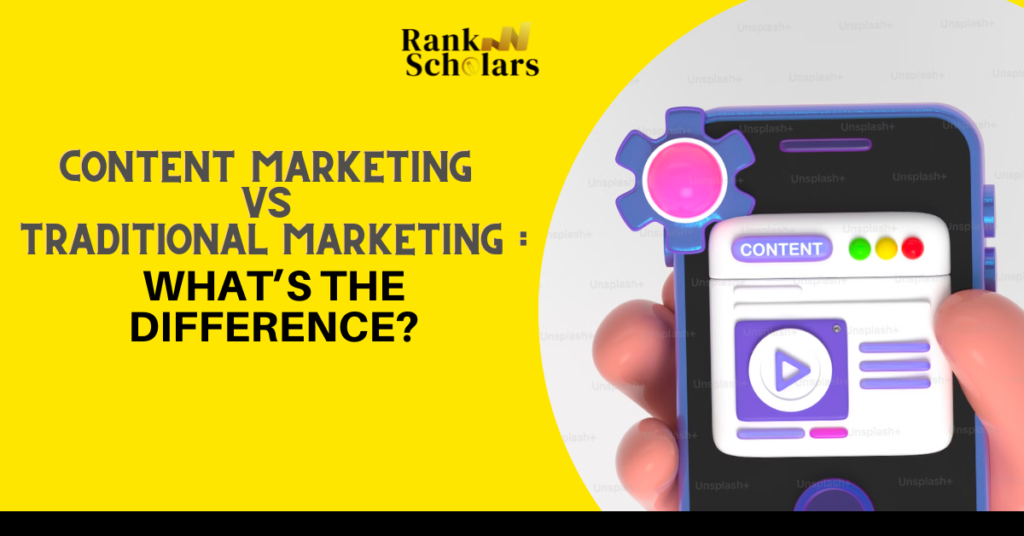Marketing has evolved significantly, presenting businesses with a myriad of options to promote their products or services. Two prominent strategies that have emerged in recent years are traditional marketing and content marketing.
In this blog post, we’ll delve deep into both these approaches and explore “Traditional Marketing vs Content Marketing: What’s the Difference?” . We’ll also provide you with valuable insights on how to effectively leverage content marketing for your business’s success.
What is Content Marketing?
Content marketing is a strategic approach that focuses on creating and distributing valuable, relevant, and consistent content to attract and engage a clearly defined target audience. The goal of content marketing is not just to promote a product or service directly but to build trust and establish authority within the industry. Content marketing involves various types of content, including blog posts, videos, infographics, podcasts, and more.
What is Traditional Marketing?
Traditional marketing, on the other hand, encompasses the conventional methods of advertising and promotion. This includes television and radio commercials, print advertisements in newspapers and magazines, billboards, direct mail, and cold-calling. Traditional marketing relies heavily on interruptive techniques to convey the brand’s message to a broad audience.
Content Marketing vs Traditional Marketing: What’s The Difference?
Below are some of the key differences between content marketing and traditional marketing.
1. Approach
Content marketing takes an inbound approach, where businesses aim to pull in potential customers by providing valuable information.
For example, if you actively publish high-quality, SEO-friendly blogs, you can generate leads & sales for your products without directly reaching out to your prospects.
Traditional marketing is more outbound and interrupts consumers’ daily lives with advertisements.
For example. you’ll need to generate ads, send mails, conduct cold calls etc. to reach out to prospects and convert them into your customers.
2. Engagement
Content marketing fosters engagement and two-way communication with the audience, building relationships over time. Your prospects can share their thoughts, add questions etc. in the form of comments.
Traditional marketing is often a one-way conversation with limited interaction.
3. Cost
Content marketing can be cost-effective in the long run as it generates evergreen content that continues to attract leads.
Traditional marketing can be expensive, especially for smaller businesses, due to high advertising costs.
4. Measurability
Content marketing offers detailed metrics and analytics to track the performance of your campaigns.
Traditional marketing metrics tend to be less precise.
5. Time
Content marketing usually takes more time as it takes time to build authority and nurture the audience. However, traditional marketing can give your results faster.
How to Use Content Marketing for Your Business
To harness the power of content marketing for your business:
1. Understand Your Audience
Know your target audience’s pain points, interests, and preferences to create content that resonates with them. Have an ideal persona and speak to one persona in a piece of content.
2. Quality Over Quantity
Focus on producing high-quality, valuable content that genuinely helps your audience. It’ll show your expertise and make them trust you more.
3. Consistency
Maintain a regular posting schedule to keep your audience engaged and returning for more. You can decide your own frequency, but stick to it.
4. SEO Optimization
Optimize your content for search engines to increase its visibility and reach. Do in-depth keyword research and target more long-tail keywords that are low in difficulty.
5. Promotion
Share your content across various channels, including social media, email marketing, and guest posting to make the most out of every piece of content you post.
Now that you’ve understood “traditional marketing vs content marketing”, it’s clear that content marketing is more relevant in today’s era and it can offer you an edge over your competitors. Even though it takes time, it offers you rewards in the long run.
Pros and Cons of Content Marketing
Let us now take a look at the pros and cons of content marketing for businesses.
Pros:
1. Builds Trust
Content marketing builds trust and credibility with your audience, leading to long-term relationships.
2. Cost-Effective
Over time, content marketing can be more cost-effective than traditional methods.
3. Educational
Provides value and educates your audience, positioning your brand as an industry authority.
Cons:
1. Time-Consuming
Creating high-quality content can be time-consuming, and results may not be immediate.
2. Competitive
The content marketing landscape is competitive, requiring constant innovation.
3. Measurement Challenges
While metrics are available, accurately measuring ROI can be challenging.
Tips for Creating Successful Content Marketing Campaigns
Below are some of the best tips that can help you create successful content marketing campaigns.
1. Know Your Audience
Tailor your content to address the specific needs and interests of your target audience.
2. Tell Stories
Storytelling is a powerful way to engage readers and make your content memorable. Share your personal insights, customer experiences, analogies and more to make it relatable to them.
3. Stay Updated
Keep up with industry trends and adapt your content strategy accordingly. You can use tools like Google Trends to stay updated.
4. Collaborate
Collaborate with influencers and other businesses to expand your reach. It can be particularly helpful when you’re just beginning out.
5. Consistency is Key
Stick to a consistent posting schedule to keep your audience engaged. Go slow, but don’t ghost.
Conclusion
In the evolving landscape of marketing, both traditional and content marketing have their merits. However, the digital era’s shift towards content marketing cannot be ignored. By understanding your audience, creating valuable content, and maintaining consistency, you can effectively leverage content marketing to grow your business.
At Rank Scholars, we specialize in helping businesses like yours navigate the world of content marketing. We are here to help you rank on Google, generate leads, and achieve your marketing goals. If you’re ready to take your business to the next level, consider contact Rank Scholars, your trusted content marketing agency.
Remember, the marketing world is ever-changing, and staying ahead of the curve is essential. Choose the path that aligns best with your business goals, and don’t hesitate to reach out to the experts for guidance and support.







